2025: The year of the global cloud outage
Last checked from Snowflake official status page 2 sec. ago
Cloud data platform for data warehousing and analytics.
Not working for you?
StatusGator last checked the status of Snowflake on and the service was operational. There have been no user-submitted reports of outages in the past 24 hours. The last officially acknowledged outage was on .
This chart represents Snowflake service health over the last 24 hours, with data points collected every 15 minutes based on issue reports, page visits, and signal strength. Sign up for free to see more Snowflake status data.
24 hrs ending
View and upvote the most commonly reported Snowflake issues to help us better indicate the service status.
Have a different problem with Snowflake?
Explore our interactive Snowflake outage map to monitor real-time incidents and service issues across the globe. This dynamic map highlights regions around the world affected by recent Snowflake outages, giving you a clear view of performance and downtime trends.
StatusGator detects outages before they are officially acknowledged by providers. Here are some recent Snowflake disruptions that StatusGator customers knew about before the rest of the world:
This rating evaluates how quickly Snowflake acknowledges incidents, the consistency of updates, and whether reported issues align with actual service disruptions experienced by users. Learn more.
Avg. delay < 15 min
This rating evaluates how quickly Snowflake acknowledges incidents, the consistency of updates, and whether reported issues align with actual service disruptions experienced by users. Learn more.
Avg. delay < 15 min
Avg. delay 15 - 30 min
Avg. delay 30 - 120 min
Avg. delay 2 - 4 hrs
Avg. delay >= 4 hrs
| Incident description | Duration | StatusGator detected | Officially acknowledged |
|---|---|---|---|
| Web console unavailable | 22m |
2m later
|
|
| Login and loading issues affecting Snowflake | 42m |
15m later
|
|
| Query submission failures due to service outage | 31m |
16m later
|
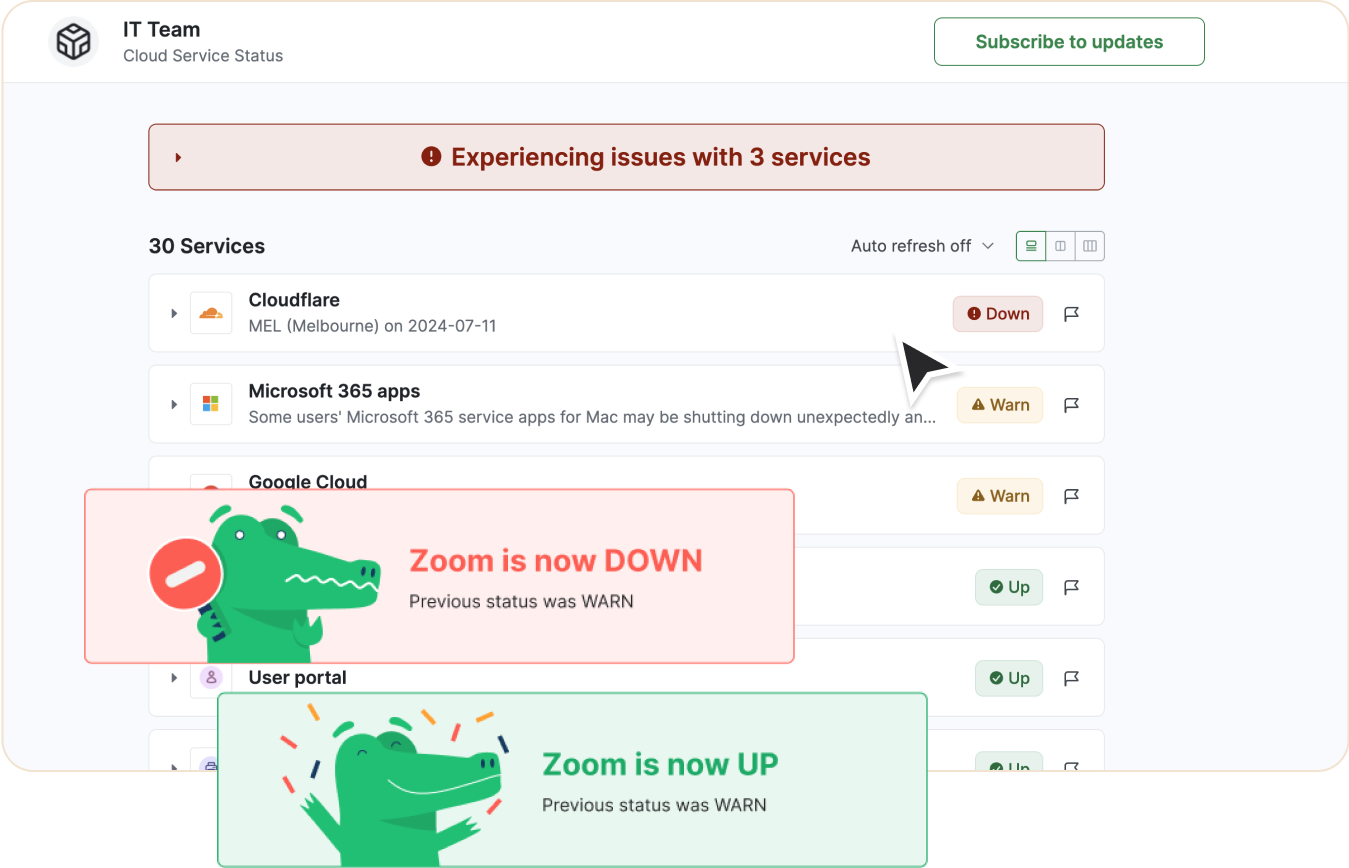
Follow the recent outages and downtime for Snowflake in the table below. If you're experiencing a problem now, check the current Snowflake status or
.| Incident Name | Duration | Started | Severity |
|---|---|---|---|
|
Azure - Central US (Iowa): INC0150687
|
45m |
Down
|
|
|
AWS - US West (Oregon): INC0150440
|
1h 35m |
Down
|
|
|
AWS - US West (Oregon): INC0150359
|
1h 10m |
Down
|
|
|
AWS - US West (Oregon): INC0150359
|
10m |
Down
|
|
|
AWS - US West (Oregon): INC0150359
|
5m |
Down
|
Stay updated with instant alerts for Snowflake outages by signing up now!
You can also monitor any service or website on your status page
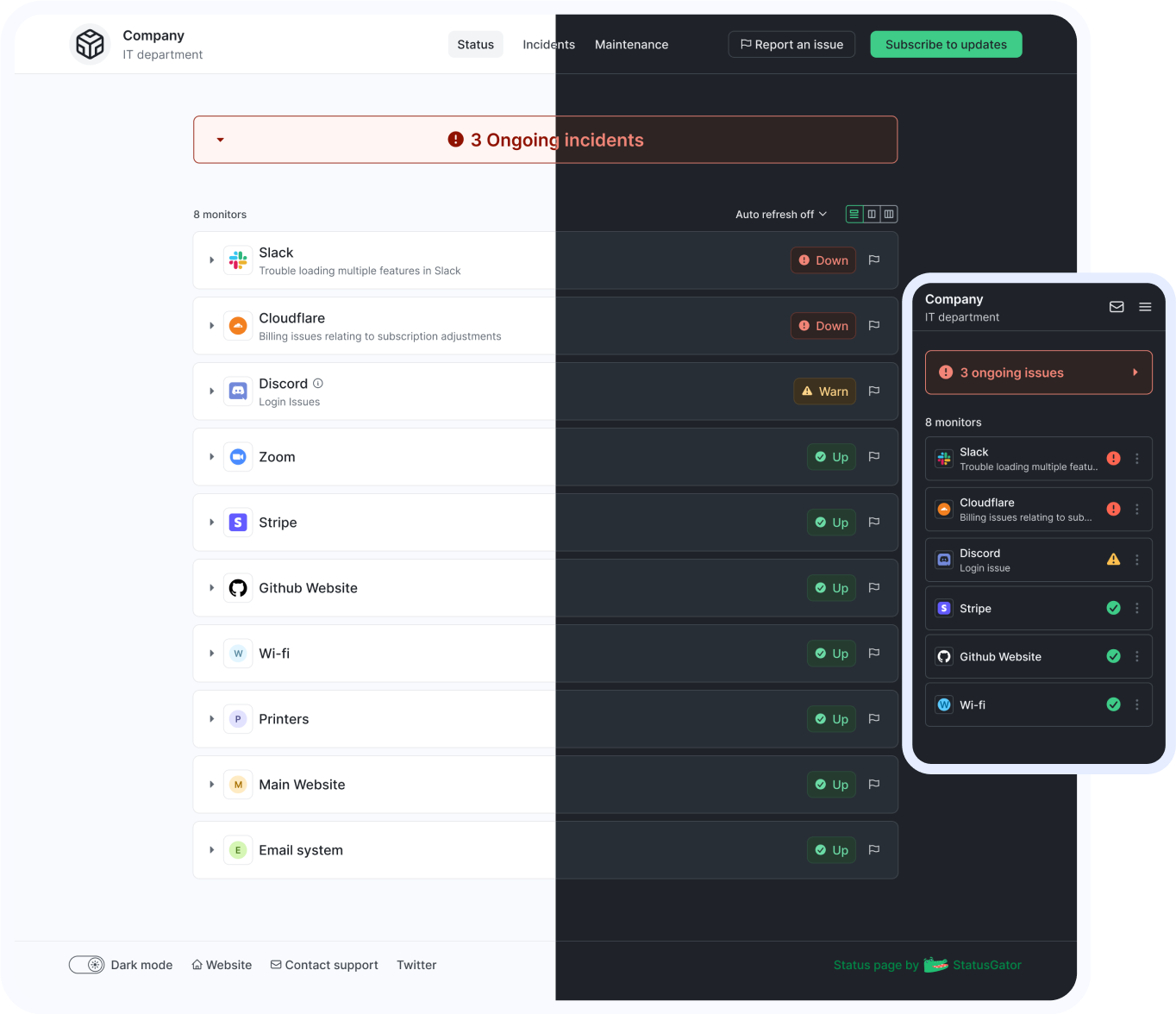
View details of the current Snowflake status below. If the status shows "Up" but you're still experiencing issues, you can
such as connectivity issues, outages, or slow performance. These issues are commonly reported when Snowflake is down or facing partial disruptions.Stay updated with instant alerts for Snowflake outages by signing up now!
With features designed to cover all your needs for monitoring and communicating outages or downtime, StatusGator keeps your team connected and informed. Stay updated on Snowflake outages, potential problems, and its current status in real-time, ensuring you're always prepared to act.
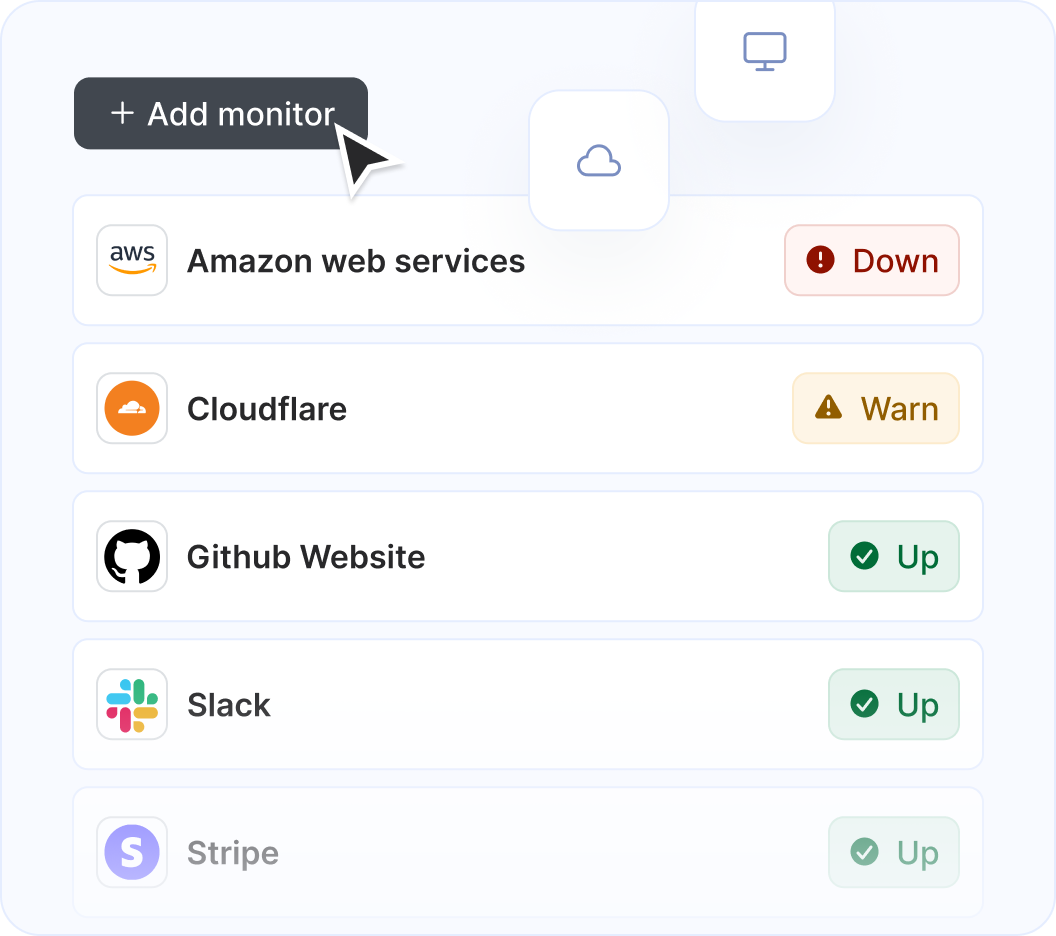

StatusGator monitors over 7,130 cloud services, hosted applications, and websites. Just add what you need to the list, and we'll automatically aggregate their statuses into a single page. You'll receive notifications for any issues affecting you and your page subscribers.
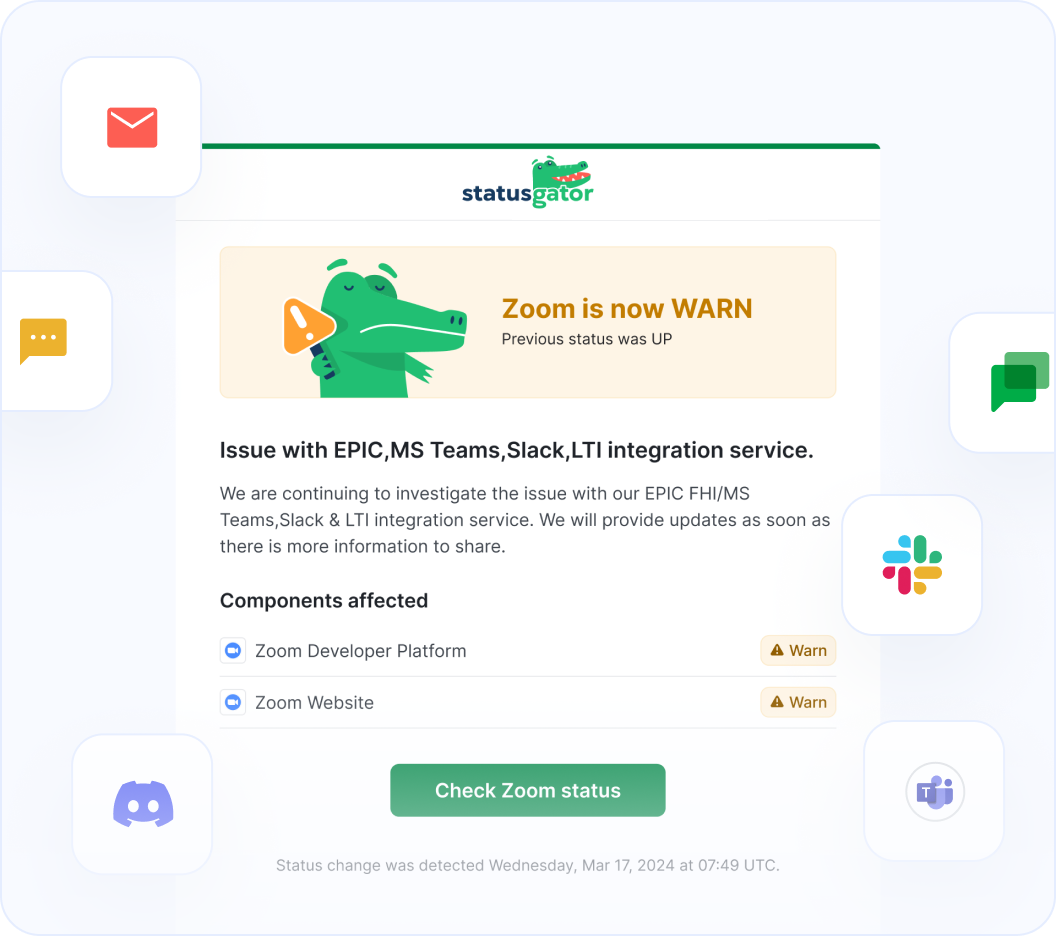
StatusGator monitors all of your services and websites and sends your team instant notifications when they go down. Stay abreast of issues that affect your team with notifications: in email, Slack, Teams, or wherever your team communicates.

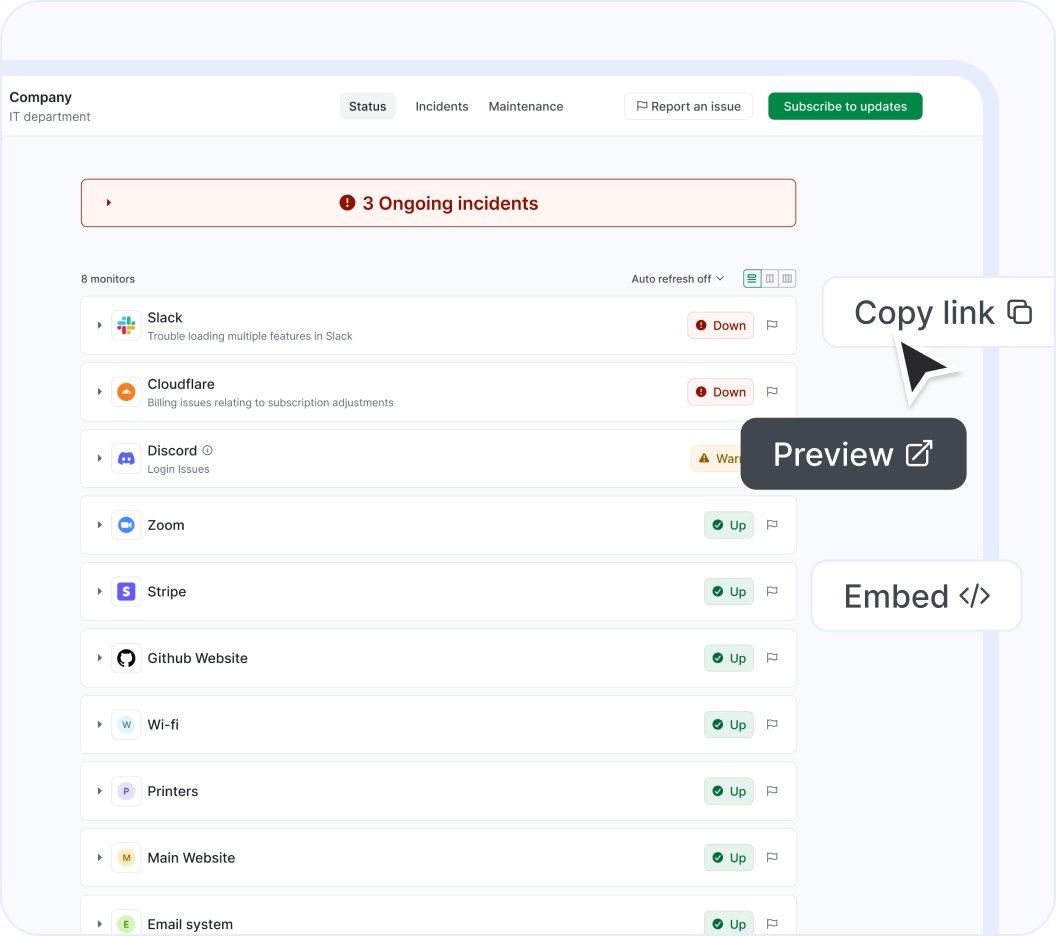

Easily notify your end-users of outages using a customizable status page. Display cloud services or websites, as well as any custom monitors you add manually. Create multiple status pages tailored to different needs, customize them, and embed them for maximum effectiveness.
Snowflake (Cloud data platform for data warehousing and analytics) is a a Database solution that StatusGator has been monitoring since February 2019. Over the past almost 7 years, we have collected data on on more than 1,048 outages that affected Snowflake users. When Snowflake publishes downtime on their status page, they do so across 600 components and 50 groups using 4 different statuses: up, warn, down, and maintenance which we use to provide granular uptime metrics and notifications.
If you're wondering, "Is Snowflake down?", or need to know its current status, we've got you covered. Our platform tracks every reported outage, performance issue, and maintenance window to ensure you're informed. Whether Snowflake is experiencing a problem now or has recently resolved one, our detailed history keeps you updated.
More than 300 StatusGator users monitor Snowflake to get notified when it's down, is under maintenance, or has an outage. This makes it one of the most popular Database services monitored on our platform. We've sent more than 32,100 notifications to our users about Snowflake incidents, providing transparency and peace of mind. You can get alerts by signing up for a free StatusGator account.
If we detect a potential Snowflake outage or other issue before it was reported on the official status page we will send an Early Warning Signal notification to StatusGator subscribers. We can often detect issues before they are officially acknowledged by the provider, giving you a head start on resolving any potential problems.
If Snowflake is having system outages or experiencing other critical issues, red down notifications appear on the status page. In most cases, it means that core functions are not working properly, or there is some other serious customer-impacting event underway.
Warn notifications are used when Snowflake is undergoing a non-critical issue like minor service issues, performance degradation, non-core bugs, capacity issues, or problems affecting a small number of users.
Snowflake posts separate notifications for planned maintenance work. StatusGator will notify subscribers when Snowflake enters a pre-planned maintenance window, keeping you up to date.
When Snowflake posts issues on their status page, we collect the main headline message and include that brief information or overview in notifications to StatusGator subscribers.
When Snowflake has outages or other service-impacting events on their status page, we pull down the detailed informational updates and include them in notifications. These messages often include the current details about how the problem is being mitigated, or when the next update will occur.
Because Snowflake has several components, each with their individual statuses, StatusGator can differentiate the status of each component in our notifications to you whenever a particular component is down. This means, you can filter your status page notifications based on the services, regions, or components you utilize. This is an essential feature for complex services with many components or services spread out across many regions.
Stay updated with instant alerts for Snowflake outages by signing up now!
Can't find your question? Email us to arrange a time to discuss. We'd love to chat!